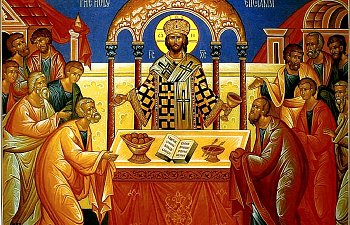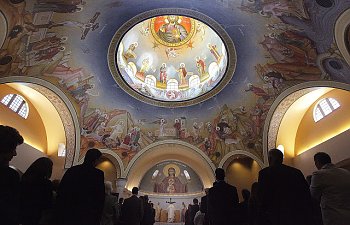Search results
-
Welcome to Christian Forums, a Christian Forum that recognizes that all Christians are a work in progress.
You will need to register to be able to join in fellowship with Christians all over the world.
We hope to see you as a part of our community soon and God Bless!
-

Comparative liturgics
Comparative liturgics, whose principles and method were developed so brilliantly by Baumstark, has delivered an even more serious blow to the hypothesis of the monastic origin of the daily cycle. This study has shown that the epoch of the development of the daily cycle after Constantine was...- Malihah
- Blog entry
- 2 min read
- Category: Christian Edification
-

In fact we can go further
In fact we can go further. First, the texts which are usually used to defend the exclusively private nature of the prayer of hours and times very plainly show that this prayer could and actually did have an ecclesiological character, was offered in the assemblies of the community. Thus, in the...- Malihah
- Blog entry
- 2 min read
- Category: Sunday School
-

Let us note first
Let us note first of all that the disagreements of historians on this point are to be explained frequently by an inadequate grasp of the question itself. Until quite recently the attention of liturgiologists has been concentrated almost exclusively on questions connected with the history of the...- Malihah
- Blog entry
- 2 min read
- Category: Sunday School
-

In this connection of the Eucharist
In this connection of the Eucharist with the Lord’s Day, so well supported by evidence from the liturgical tradition of the early Church, we have therefore a confirmation of that eschatological theology of time of which we have been speaking. The eschatology of the new Christian cult does not...- Malihah
- Blog entry
- 2 min read
- Category: Sunday School
-

In the Church this first-eighth day
In the Church this first-eighth day (the Lord’s Day: κυριακὴ ἡμέρα) is the day of the Eucharist. The early Christian tradition bears uniform witness to this fact. The Eucharist has its day, Christians gather together on a statu die— on an established day. We know that the ‘Day of the Sun’ was...- Malihah
- Blog entry
- 2 min read
- Category: Christian Edification
-

Christ rose not on the sabbath
Christ rose not on the sabbath, but on the first day of the week (μία σαββάτων). The sabbath was the day of His rest, His ‘en-sabbathment’ in the tomb, the day which completed His task within the limits of the ‘old aeon.’ But the new life, the life which had begun to ‘shine out of the tomb,’...- Malihah
- Blog entry
- 2 min read
- Category: Sunday School
-

The appearance of this new day
The appearance of this new day is rooted in the expectation of salvation, in that striving toward the future and in those messianic hopes which were just as characteristic of the theology of the Old Covenant as the cult of the Law. If in the sabbath the Hebrew honours the Creator of the universe...- Malihah
- Blog entry
- 2 min read
- Category: Christian Edification
-

For the early Church
For the early Church the Lord’s Day was not a substitute for the sabbath; it was not (so to speak) its Christian equivalent. On the contrary the real nature and significance of this new day was defined in relation to the sabbath and to the concept of time connected with it. The key position of...- Malihah
- Blog entry
- 2 min read
- Category: Sunday School
-

We must first see
We must first see how well grounded is the idea of the liturgy of time on which we have based our notion of the structure of the early Christian ‘rule of prayer.’ We find support in the obvious link between the Eucharist and time expressed from the very first days of the Church in the Christian...- Malihah
- Blog entry
- 2 min read
- Category: Christian Edification
-

The Mystery of the Eighth Day
…The liturgy of time [i.e., the daily cycle of evening prayer (Vespers) and morning song (Matins) and the other hours of prayer; the weekly cycle moving from Sabbath to Sabbath; and the yearly cycle of feasts and seasons] now recognized as the old Jewish cult preserved by the Church was…...- Malihah
- Blog
- eucharist sabbath sunday
- Blog entries: 9
-

The Meaning of “Agape”
The impact of the Greek word agape — which is usually translated as love in English — remains one of the most inspiring aspects of the Eastern Orthodox Church. Agape is the term first used by the early Christians to refer to the meal or “love feast” that Jesus would have for fellowship with His...- Malihah
- Blog
- agape

